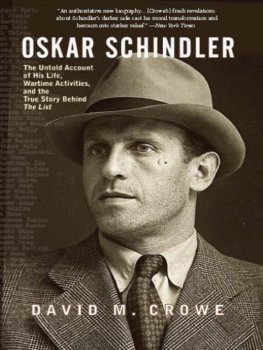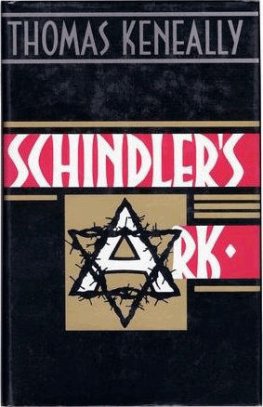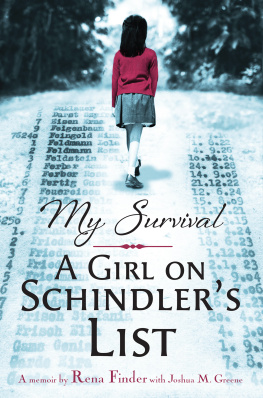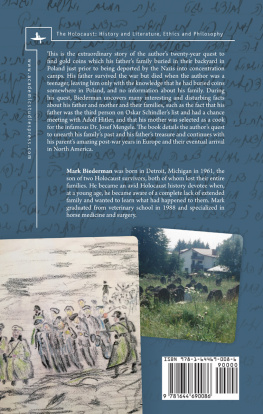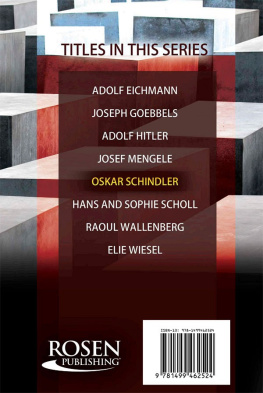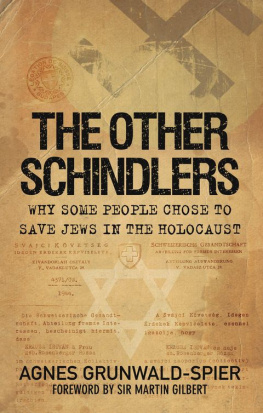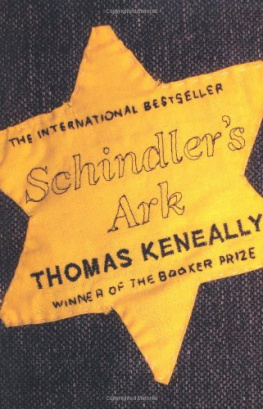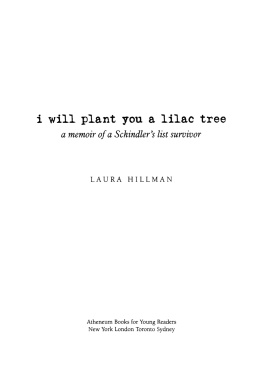Cover image: Auschwitz, Poland (via depositphotos.com) with insert Krisia Perlberger, circa 1939
All Rights Reserved. No part of this publication may be reproduced or transmitted in any form or by any means, electronic or mechanical, including photocopy, recording or any other information storage and retrieval system, without prior permission in writing from the publisher.
Introduction
The war retold
On 8 January 1996, a wet Monday in So Paulo, Krystyna Hein, formerly Krisia Perlberger, also known as Krisiu, Krysia and other variations, all derived from Polish, gave her testimony to the team at the Shoah Foundation, at the University of Southern California, known then as Survivors of the Shoah Visual History Foundation.
The institution had been founded by Steven Spielberg two years earlier. No other Hollywood director or movie producer has had so many productions listed among the 100 best films in the entire history of cinema. He has won dozens of awards for his creative work; he won the Oscar for Best Film for Schindlers List, made in 1993 and considered to be his masterpiece. And this is not his only Oscar.
Spielberg became so emotionally involved with his own film that he decided to set up an institution to collect the testimonies of the last survivors of the Holocaust. It was a brilliant and viable idea for a wealthy, well-connected man. Thousands of victims from several countries were able to tell their personal experience. Some of them lived in a nation that had built apparently limitless power, persuading its citizens that there were inferior beings in their midst whose summary removal would bring peace and prosperity to the empire, that would then last for a thousand years and would spread across continents.
Given that in 1995, 40 years had passed since Germanys defeat, presumably thousands of people between 60 and 70 years of age still had a personal contribution to give to the world in helping elucidate the cliched maxim that those who learn from history will be condemned to repeat it.
This is a nice sounding axiom of little practical relevance. If history has taught its observers anything over the centuries, sadly it is that people will more readily preserve the memory of their religion, bigotry and ideology than the pain and shame that should be kept alive in our minds. It is worth noting too that ignorance is always more powerful and effective than knowledge. Testimonies, dismissed as old people, are not considered indicative and tend to be undermined by generations that have broken new ground and are therefore disparaging of the values and ills that afflicted their predecessors.
Clearly there will be people who will contest these lessons, although curiously, a minister of the Brazilian state emulated Joseph Goebbels himself on national television in January 2020. The poor man, relieved of his post the very next day, did not even have time to understand what he had done. Some considered him to be a neo-Nazi or something similar. I do not believe this was the case. The young clown was simply following a script without evaluating, either before or after, the meaning of what he was saying nor the role he was playing. I dare say that if he had actually come face to face with Goebbels, he would have been scared witless.
However, we should see the testimonies provided to the Shoah Foundation through different eyes. Technological advances alone have made it possible and economically viable to transform separate interviews into a reasonably precise patchwork of what happened in those years, the subtlety and opprobrium of each humiliation, the guilt, the innocence and the supposed heroism of some people. Heroism, that may or may not be justified, having been won by trading in peoples freedom.
If it is true that history is the story of the winners and therefore it is distorted by them, the same cannot be said when events are narrated by the victims, above all when they have no political intentions. Victims simply tell their stories. Underlying their words are sensations of pain and hatred, notwithstanding exaggerations and omissions due to memory lapses, of course.
Anyone who sees the survivors testimonies is certainly party to true stories. Tone of voice, tears shed and body language help clarify understanding and doubt about what is being said. The more that people tell their own stories and the more comparisons interested parties can draw, the greater the chance of nearing the truth.
As with research based on samples, the larger the accumulation, the lower the margin of error to the point where it reaches near insignificance.
When I read some of the interviews that helped with producing this book, I realised, however, that the attitude of each one of the survivors would never allow for a sense of harmony or hegemony in the accounts. Some talk a great deal, some brush over the details, some remember so much and some hardly anything at all. This is just the way people are, with or without wars.
What Spielberg did possibly his greatest legacy, despite some brilliant films was to create a retelling of the war, not by winners or by losers. The war told by those who suffered it. From now on, somehow, there will always be witnesses during wars, unless all the victims perish or decide to be silent once the war has ended.
In the future, if a compilation is made quickly enough of all that remains, it will not be acceptable for an international court such as the one held in Nremberg to lead to a total of only 12 death sentences, for millions of murders carried out without any military justification. This is the precise number of perpetrators hanged for the biggest act of extermination ever carried out.
In the future, the story told by Krystyna Hein, aged 64, in her short and, in some sense, neutral testimony of January 1996, will be equally important to her children and grandchildren living in a country she did not know in her childhood, as will those told by other survivors whose experiences of the war were shorter (although never less painful) but whose video accounts go on for four, five or six hours.
Her stories are in this book, along with speculations, gaps filled by mere logic and conclusions reached through research. In the stories told here are accounts by others. They were linked to the most tragic, complex and pertinent event of the 20th century. These were chosen by the author on the condition that I had to personally meet and evaluate each of the sources myself.
I postponed writing on this subject for decades. I concluded, perhaps precipitously, that even if I did so, Id have nothing to add to this story, which has been told so many times that it has become a clich and has lost most of meaning.
I once wrote that all paradises have lost their meaning because of the simple fact that the terms paradise and paradisiac have been used with such lack of criteria and hierarchy that there is simply no way to distinguish the coral reefs of Polynesia and Indian waterways from any old fetid strip of sand around the world. Nowadays, paradise is an expression used by people selling car parts or sweets made from corn.


